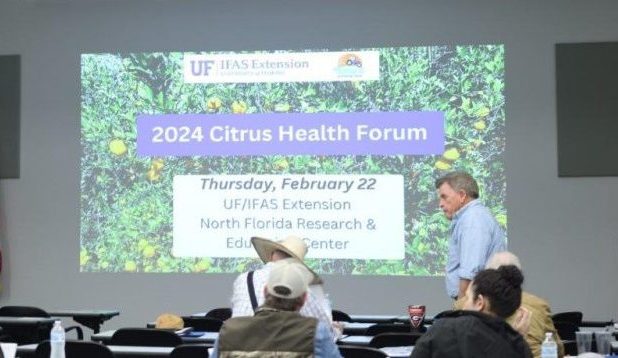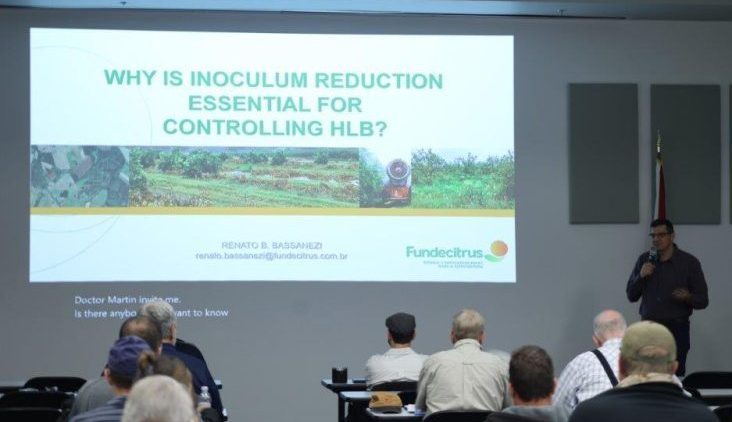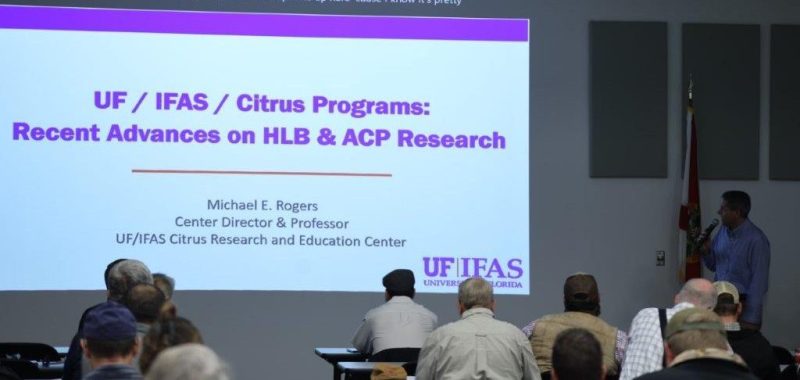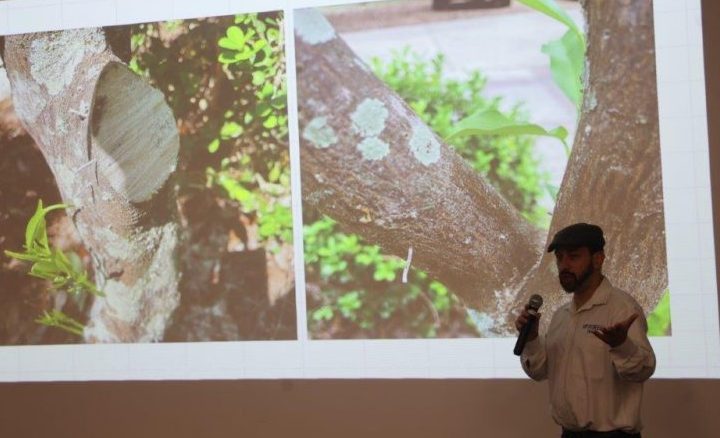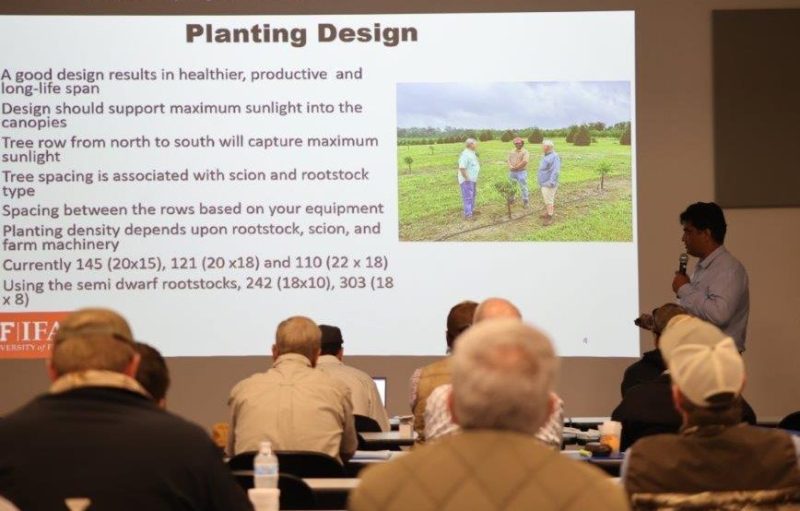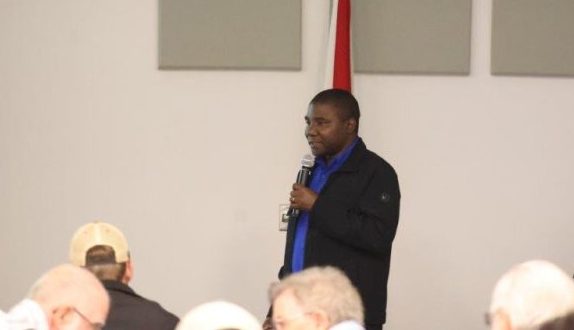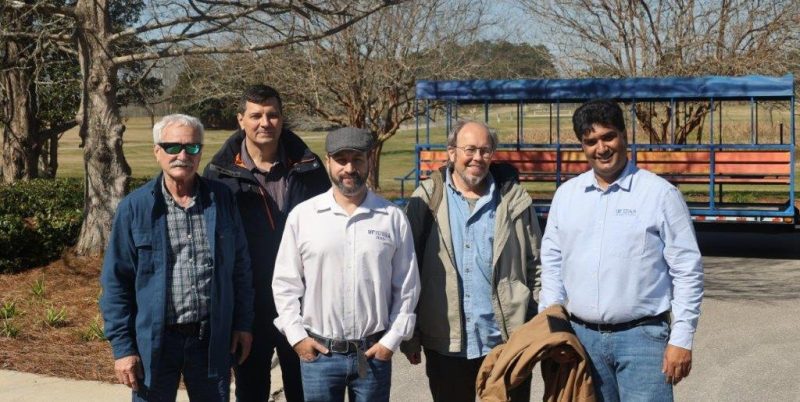The 2024 Citrus Health Forum was held on February 22, at the North Florida Research & Education Center (NFREC) in Quincy, Florida. There were six educational presentations and a tradeshow with 10 booths. Growers also had the opportunity to earn Florida and Georgia Pesticide Applicator Continuing Education Units (CEUs) and Certified Crop Advisor (CCA) CEUs. This year’s Citrus Health Forum was centered around prevention of citrus Huanglongbing (HLB) or what as known as “Citrus Greening.” This disease is most prevalent in South and Central Florida, but our North Florida growers want to be as prepared as possible in order to help protect the industry in this part of the state.
–
The first presentation was given by Dr. Renato Beozzo Bassanezi, from Araraquara, Brazil. He is employed through the Fundecitrus (Fund for Citrus Protection) which is an institution that was started in the late 1970s to help support citrus growers and their development in the industry. Dr. Bassanezi presented his research on inoculum reduction in citrus groves. Through his research, he has been able to conclude there are no resistant citrus varieties to the disease and no treatment plan that can eradicate HLB fully or keep the tree’s fruit yield as it was when the tree was healthy. Dr. Bassanezi also recommends removal of diseased trees, with psyllid control on a regional scale within and outside of commercial citrus groves, for ultimate success in attempting to control the spread of HLB. To view Dr. Bassanezi’s presentation, please use this highlighted link:
Bassanezi – Inoculum Reduction is Essential for Controlling HLB
–
Dr. Michael Rogers presented the second topic, and gave updates on recent research the UF/IFAS Citrus Research & Education Center (CREC) has performed. Dr. Rogers explained that Florida’s initial response to HLB and psyllid control has been scouting, diseased tree removal, and emphasizing buying trees from protected nurseries within Florida. According to Dr. Rogers, UF/IFAS researchers have discovered 30 to 40 percent root loss in HLB diseased trees occurs before “above-ground” symptoms appear, limiting the tree’s nutrient and water uptake. The CREC’s current research is centered around the root health of diseased trees, adequate fertilization techniques, and tree stress reduction. He shared that almost 3 years after soil acidification amendments are performed in a citrus grove, that HLB diseased tree’s fruit yield drastically improved. If you would like to view the full presentation given by Dr. Rogers, please use the following link for full access:
Rogers Advances in HLB & ACP Research
–
Our third presentation was provided by Dr. Xavier Martini. Dr. Martini is based at the NFREC in Quincy as an Assistant Professor in Entomology, where his research is based around horticulture pests, specifically in citrus production. Dr. Martini provided the latest updates with specific citrus pests, since the December 2022 freeze event. Dr. Martini touched on how the freeze caused extreme stress in citrus groves, such as defoliation systems which could deter citrus whiteflies, scale insects, and rust mites. But now that trees are beginning to heal from the freeze damage and show new growth, they are more susceptible to citrus leafminers, aphids, and Asian citrus psyllid. Before the December 2022 freeze, Dr. Martini and his staff scouted 6 sites for citrus psyllid. From these sites, 31 psyllid insects were isolated for observation in Apalachicola, Florida and Bristol, Florida. After 4 days of below freezing temperatures, no psyllids survived in the Bristol location and only one in Apalachicola. Even thought the freezing temperatures put a halt on the psyllid population, it did not eradicate the pest completely, as adult psyllids were located at both sites again in April 2023. To review Dr. Martini’s presentation further, please use the following link:
Martini – 2024 Citrus Pest Update
–
The fourth presentation was given by Dr. Muhammad Shahid, based at the NFREC in Quincy. Dr. Shahid is an Assistant Professor of Horticulture who specializes in the research of stress physiology in fruit crops, specifically citrus. Dr. Shahid presented information on important considerations for the establishment of a new citrus grove. With the boom of beginning farmers entering citrus production, it is important to understand the key things to consider for ultimate fruit crop success. Dr. Shahid touched on grove site selection, recommended irrigation systems, variety and rootstock selections, canopy management, and more. When a grower is working to find the best place to establish a new grove it is important to consider the pest and disease history of the area prior to planting, the soil fertility, water access and quality for irrigation methods, and the topography of the desired grove site. If you would like a more in depth look at Dr. Shahid’s presentation, please use the following link for full access:
Shahid – Starting a New Citrus Grove
–
Dr. Davie Kadyampakeni gave the fifth presentation on the topic of improving water management qualities in irrigation for more sustainable commercial citrus production. Dr. Kadyampakeni is an Associate Professor at the UF/IFAS CREC in Lake Alfred, where his research focuses on citrus water and nutrient management. Dr. Kadyampakeni presented the growers in attendance with information on the importance of irrigation management and the tools available that can aid them. There are plant-based and soil-based moisture sensors on the market to help growers adapt their irrigation schedules based off their tree’s needs and the soil they reside in to hopefully save irrigation and fertigation costs over a period of time. Because the soil type is mostly sand in Florida, more information on irrigation management is needed to optimize water usage. Dr. Kadyampakeni’s presentation can be accessed using the following link:
Kadyampakeni – Citrus Irrigation and Nutrient Management
–
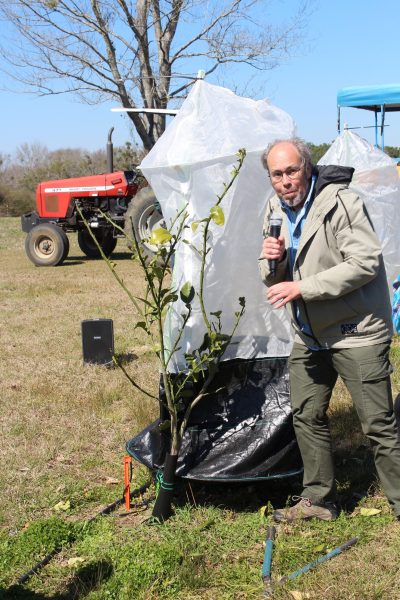
Dr. Fernando Alferez Pruning Demonstration, Photo Credit: Julie McConnell, UF/IFAS Extension Washington County
After a wonderful lunch, attendees loaded up on trolleys and headed to the research citrus groves on site at NFREC. In the grove, Dr. Shahid and Dr. Fernando Alfrez gave a pruning demonstration and presented information on a new variety they have been evaluating. Dr. Alferez is an Assistant Professor in Citrus Horticulture at the Southwest Florida Research & Education Center (SWFREC). Dr. Alferez demonstrated for the growers on how to prune a young tree (aged between one to two years old) to open up the canopy naturally to optimize the potential fruit yield. Dr. Shahid also showed a recent product study that he is working on with a local grower for a mechanical method of freeze protection in young trees.
The following pictures share a few highlights from the research center tour.
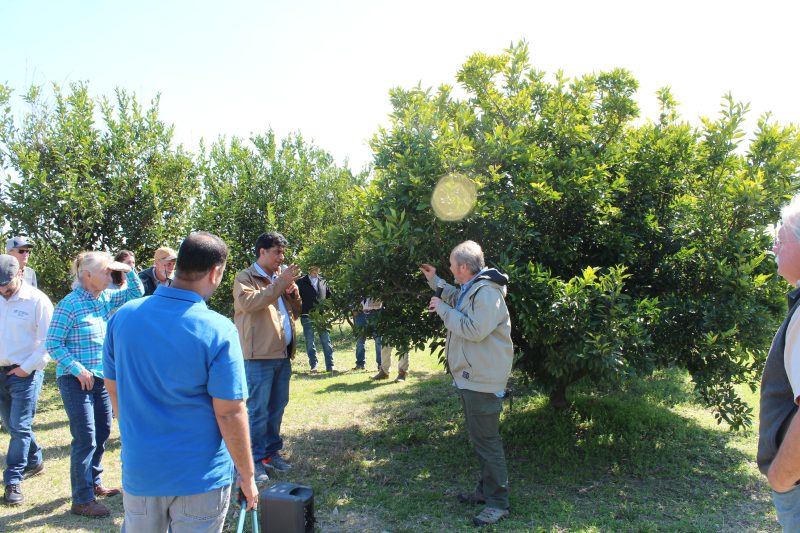
Dr. Shahid and Dr. Alferez explaining the importance of pruning of an older tree. Photo Credit: Julie McConnell, UF/IFAS Extension Washington County
–
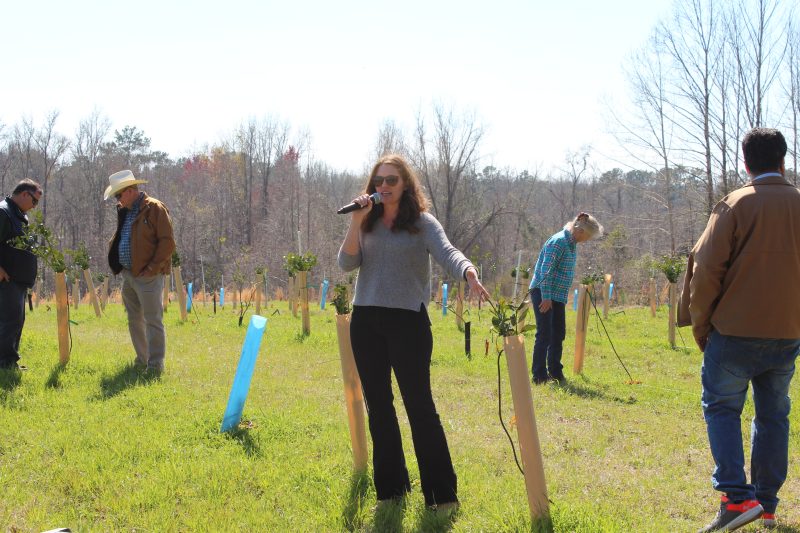
Local grower, Kyli Lamar explaining her project collaboration with Dr. Shahid. Photo Credit: Julie McConnell, UF/IFAS Extension Washington County
–
–
All in all, it was a great day. The organizers would like to extend a thank you to the sponsors for participating in this event. Without them, the 2024 Citrus Health Forum would not have been possible. Be on the lookout for next year’s event date in March 2025!
- 2026 Citrus Health Forum- February 19 - January 9, 2026
- 2026 Tri-State Fruit & Vegetable Conference – January 29 - November 7, 2025
- Direct Marketing: How Panhandle Produce Growers Are Adapting - October 10, 2025

